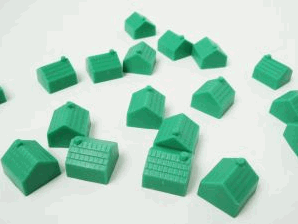Loss Aversion and the Housing Market
by Brandon Fuller For many people, the pain of losing $500 outweighs the pleasure of gaining $500. As Austan Goolsbee points out in a recent New York Times column, this aversion to loss is especially acute when it comes to selling real estate. People are stubborn about selling a house for less than they paid for it. If selling at prevailing market prices means accepting a significant loss, some people refuse to sell at all, or else base pricing decisions not on what they would willingly pay to buy a similar house today, but rather on what they paid for the house when they bought it. As a result, sellers who bought houses during the peak of the housing boom will list their properties for a higher price than nearly identical homes purchased earlier on at lower prices. At worst, the strong reluctance to sell at a loss leads to a prolonged freeze in the housing market, with many homes listed for sale at prices that buyers will not pay. Since people who sell a house often go on to purchase another, loss aversion can contribute to weaker housing demand and prolong the housing slump.
For many people, the pain of losing $500 outweighs the pleasure of gaining $500. As Austan Goolsbee points out in a recent New York Times column, this aversion to loss is especially acute when it comes to selling real estate. People are stubborn about selling a house for less than they paid for it. If selling at prevailing market prices means accepting a significant loss, some people refuse to sell at all, or else base pricing decisions not on what they would willingly pay to buy a similar house today, but rather on what they paid for the house when they bought it. As a result, sellers who bought houses during the peak of the housing boom will list their properties for a higher price than nearly identical homes purchased earlier on at lower prices. At worst, the strong reluctance to sell at a loss leads to a prolonged freeze in the housing market, with many homes listed for sale at prices that buyers will not pay. Since people who sell a house often go on to purchase another, loss aversion can contribute to weaker housing demand and prolong the housing slump.The housing correction in the U.S. continues to reduce house prices in many regional markets. The correction raises the risk of a downturn in the U.S. economy. As house prices decline (other things being equal), household wealth declines, and consumption expenditures decrease. The shock to consumption spending may contribute to slower growth or even a recession. As Goolsbee points out, loss aversion in the housing market adds to the gloomy outlook for the broader economy. The reduction in housing-market transactions affects the consumption of durable goods and increases the costs associated with switching jobs. Read Goolsbee's column to find out more.
Discussion Questions
1. According to the article, what fraction of home buyers are moving within a metropolitan area? How will seller reluctance to lower prices during a housing slump affect the number of future buyers in a local housing market?
2. Suppose a beet farmer arrives at the farmers' market only to discover that other beet farmers are selling identical beets for less than he had intended to sell his own beets. He is likely to succumb to competitive forces and sell his beets at the prevailing price. Why are house sellers, unlike beet farmers, unwilling to lower their prices? Does it have to do with characteristics of the sellers or characteristics of the markets?
3. What are durable goods? Why would this type of housing-market freeze impact sales of durable goods? Why do you think the ups and downs of durable-goods sales are closely aligned with the ups and downs of the business cycle?
4. Frictional unemployment refers to the relatively short spells of unemployment associated with finding and transitioning to a new job. For example, a recent college graduate searching for her first job or a banker transitioning between jobs in different areas will be frictionally unemployed until they start at their new positions. How might a prolonged housing freeze increase frictional unemployment? To what extent might a housing freeze cause people to stay in jobs they would otherwise leave?
Labels: Behavioral Economics, Business Cycle, Global Economic Watch, Unemployment



0 Comments:
Post a Comment
<< Home